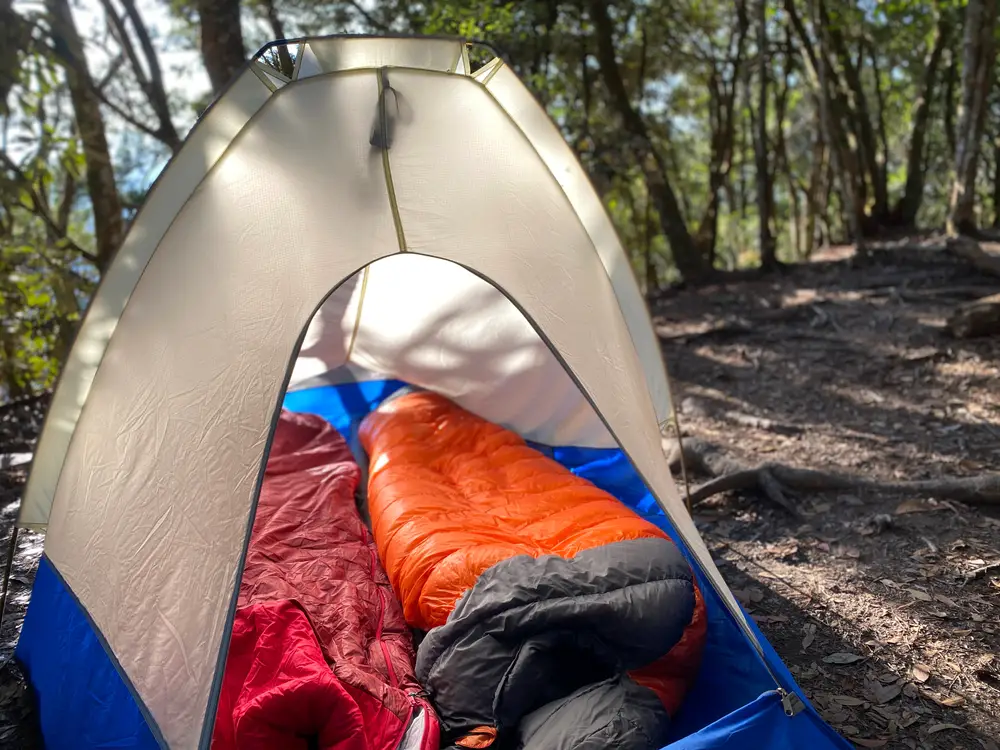There is no better feeling than being in the great outdoors, is there? The sound of babbling brooks, birds chirping, and the wind rustling through the trees creates the perfect environment for your relaxing weekend.
But when it comes to camping, the weather is not always your friend. No matter our best efforts to plan, we still find ourselves in sleeping bags shivering while the wind beats against the tent.
You wonder, is there any way to stay warm while you are in a tent? Well, there is a way, and we are here to tell you all about it! Keep reading to have your tent-related queries answered!

Table of Contents
How do you stay warm in a tent?
You can stay warm in a tent a few ways, and they all begin with preparation! It’s better to prepare for a cold night ahead than to be surprised and shivering.
In these cases, layers and thermals are your best friend. Add these layers as soon as the temperature drops to avoid feeling cold and unable to warm up.
Hot water bottles are another fantastic addition that will keep you warm. You will also need a kettle and stove for the hot water, but popping one in your sleeping bag before bed will make a difference!
Alternatively, warm drinks or exercise before bed will raise your core temperature and keep you toasty before bed.
Sleeping bag liners will add more warmth to your sleeping bag and keep you insulated at night. You can also take extra blankets or a duvet that will be thicker to sleep under than a sleeping bag offering more warmth.
Insulating the floor is another option; mats can be used to add a layer between your air bed and the floor, creating heat that will be much appreciated if the ground is cold.
Also, be sure that you use the correct size tent. Larger tents will take longer to heat; if you are solo camping, a smaller tent might be a better fit!
Portable heaters are another option to heat your tent, but be mindful of these! They need to be used safely as they can cause fires if left to overheat.
It is best that you only use these appropriately and turn them off before falling asleep.
Can you survive winter in a tent?
You can survive winter in a tent, but it requires a lot of work to do so. Preparation again is key to a successful winter in a tent!
A well-insulated tent, sleeping bag, sleeping pads, and a stove are some essentials that you will need to avoid feeling the chill.
You must choose a sheltered location to survive the winter in a tent. Look for a spot that is sheltered from the wind and is free from potential avalanche danger.
You will need to pack down any snow before erecting your tent, too, so be sure to allow ample time and daylight for this.
When camping in the winter, the correct clothing will go a long way to ensuring you last the winter. Layers fleeced clothing, and hats, scarves, and gloves should be at the top of your list!
Increasing your calorie intake will also help you survive the winter. Lots of hot drinks will keep you hydrated and nutritious meals will help your body survive in the colder months.
Remember to take your cooking essentials to allow for this; a stove and kettle will quickly become your best friends.
While camping in the winter is more challenging, there is no reason that you cannot camp in the winter. Just be sure you have the necessary equipment and are prepared for some chilly evenings!
How much warmth does a tent add?
Generally speaking, a tent will add roughly 5-10 degrees more warmth than if you were to camp without a tent.
The amount of warmth depends on the weather outside and the positioning of the tent. Consider the position of the tent when erecting it.
If your tent isn’t under direct sunlight or in warm temperatures, then you can expect an extra 5-10 degrees of warmth.
It doesn't sound like a lot, but it will make a massive difference, especially in colder temperatures! How well insulated your tent is, and its size will impact the warmth of the tent.
Smaller tents tend to be warmer as there is less space for the heat to spread out and escape through extra doors or ventilation points. Smaller tents are also easier to keep warm during the night.
You can expect your tent to get quite warm in the sunlight in warmer climates or the summertime.
In some cases, it will be quite stuffy and difficult to stay in the tent during the daytime. You can try and trap this heat, though, for a warmer evening in the tent!
- Are Merrell Shoes Good? – An Unbiased Review of Merrell Footwear - December 9, 2023
- Where Are Merrell Shoes Made? - December 9, 2023
- Camping in 40-degree Weather: Tips and Tricks - September 25, 2023


![How to Stay Warm Sleeping in a Car? [Detailed Guide & Tips] How to Stay Warm Sleeping in a Car? [Detailed Guide & Tips]](https://grandcircletrails.com/wp-content/uploads/2021/10/How-to-Stay-Warm-Sleeping-in-a-Car-1-150x150.jpg)
![How Warm Is 600 Fill Down? [Stay Tuned For This Guide] How Warm Is 600 Fill Down? [Stay Tuned For This Guide]](https://grandcircletrails.com/wp-content/uploads/2022/08/How-Warm-Is-600-Fill-Down-150x150.jpg)
![How To Stay Cool When Camping? [Explained] How To Stay Cool When Camping? [Explained]](https://grandcircletrails.com/wp-content/uploads/2022/06/How-To-Stay-Cool-When-Camping-150x150.jpg)

![Are Patagonia Jackets Warm? [Temperature Ratings Included] Are Patagonia Jackets Warm? [Temperature Ratings Included]](https://grandcircletrails.com/wp-content/uploads/2022/04/Are-Patagonia-Jackets-Warm-1-150x150.jpg)